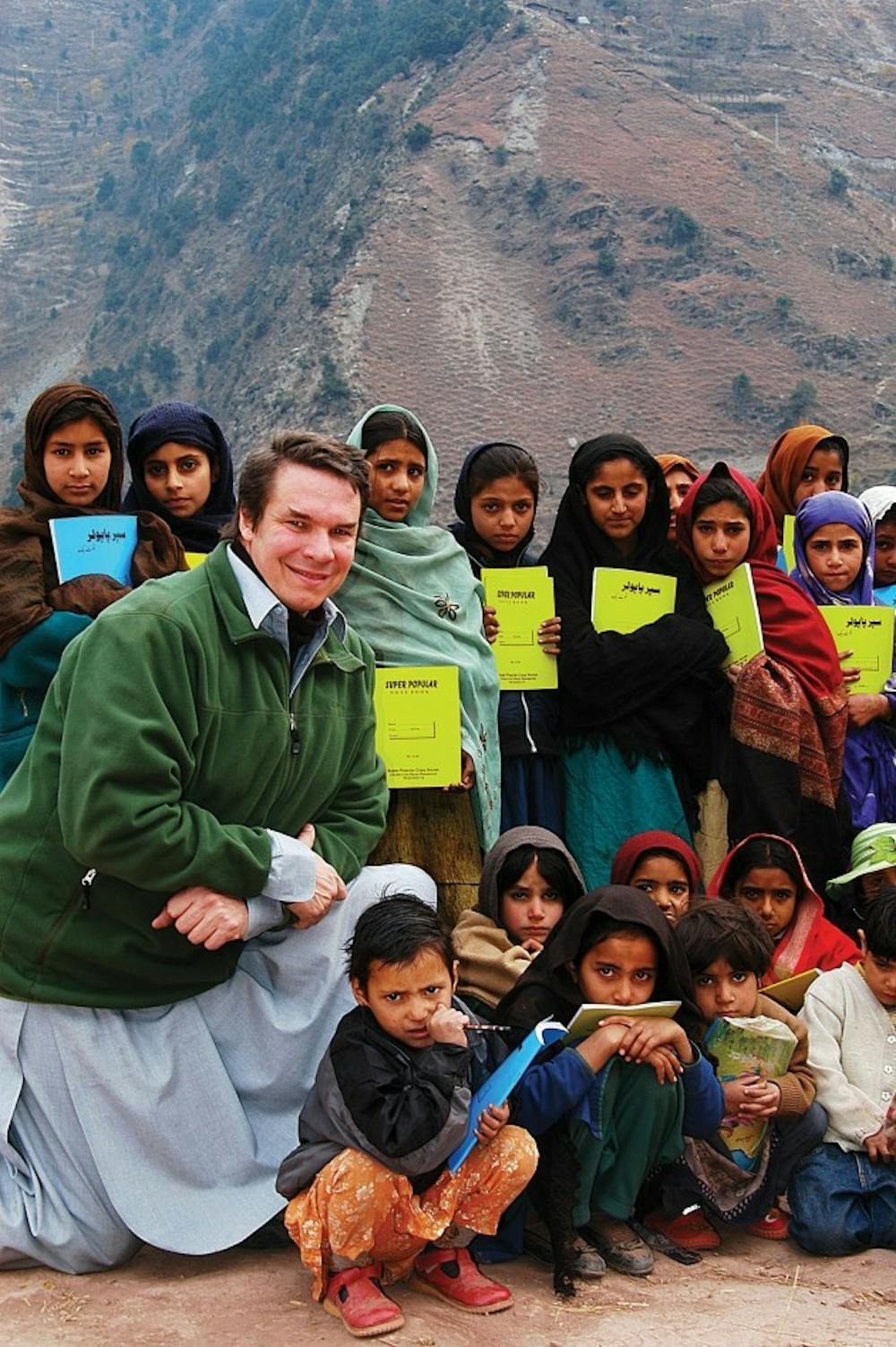Greg Mortenson, co-author of Three Cups of Tea, spoke to UB students, faculty and members of the Western New York community at Alumni Arena Wednesday night. Three Cups of Tea has been a New York Times bestseller since 2007, selling over four million copies.
Mortenson's experience of building a school in Pakistan, chronicled in Three Cups of Tea, has essentially become required reading for the U.S. commanders and troops deployed to Afghanistan. As an unofficial adviser to the Pentagon, his story has become essential to understanding the culture and societal pulls of the region.
His lecture highlighted his failed attempt to surmount K2, the world's second-highest mountain, and his accidental encounter with the people of Korphe, Pakistan, where he was honored as a guest. When the children asked for a school to replace the sticks and mud that served as learning materials, Mortenson promised to return and build a school.
"When you start something, try not to look at it in terms of, ‘oh, we have to buy 20 desks' or, ‘we have to build a school,'" Mortenson said in an interview with The Spectrum. "Look at it from a human perspective – what's the impact of an education for one young girl, how that is going to change her society. Look at solutions in generations."
In a world where women are frequently ignored or oppressed, educating women is revolutionary and can change a society. For instance, women are legally allowed to own land in Pakistan but are frequently illiterate and are thus unable to manage the contracts, effectively forfeiting their right.
"Education reduces infant mortality. Education reduced the population explosion. When women or societies are illiterate, they tend to have 10 or 15 babies," Mortenson said. "A literate woman with a 10th grade education tends to have three or four babies, so a lot can happen with education."
However, this promise was much easier said than done.
Mortenson's first funding came, ironically, from children in elementary school, who raised 65,000 pennies to help the children of Korphe. Inspired by their donation, Mortenson founded "Pennies for Peace," an international service-learning program meant to empower Pakistani and Afghani communities through education. The organization has grown to tens of thousands of participants and was the group that Stay Up UB, the annual UB dance party, chose to support this year.
After sending 580 letters, Mortenson finally received a $12,000 check from Dr. Jean Hoerni, a Swiss-born physicist and fellow mountain climber, which was crucial in making his dream a reality.
However, Mortenson's school is different than schools in the U.S.
"Any school [in Pakistan and surrounding countries] should be thought of as more of a community center than just a school. In our schools, we teach hygiene, sanitation [and] nutrition, starting in first grade. Also, with birthing, there's some things that can be taught," Mortenson said. "In some areas of the world, women go into birth without any training and they don't even have a skilled person [nearby.]"
Unfortunately, in light of the Sept. 11 terrorist attacks, many Americans have criticized Mortenson for attempting to help Muslims. However, he asserts that there is no military solution in Afghanistan and that when children are trained to kill and hate, they cannot distinguish the difference between life and death. Mortenson has also faced opposition from those who think he shouldn't encroach on Middle Eastern cultures.
"I get criticized for that a lot, but we go to extreme lengths to embrace the culture. Our schools are entirely run by community committees. We also teach five languages by fifth grade… and we [also] have the elders come in twice a week and do storytelling," Mortenson said. "I really think it's important that their heritage, folklore and culture is preserved…You have to be very considerate of cultural and faith issues."
Mortenson mentioned his childhood in Tanzania. He and his family moved to the U.S. when he was 15, which was when he first experienced racism.
"[As a child], I went to school with children from two dozen countries. I used to go into mosques and synagogues and churches and Buddhist temples and we'd celebrate Diwali and Hanukkah and Christmas," Mortenson said. "My first day in high school at St. Paul, Minnesota, I got beat up because I said I was African… That was the first time I learned what the word ‘racism' meant. It wasn't in Africa; it was here in the U.S."
Perhaps change is occurring in the U.S., though. Mortenson cited a U.S. News and World Report study that showed that in 1990, 18 percent of college graduates wanted to "go out and make the community or world a better place." Today, the same statistic is at 50 percent, and Mortenson believes the percentage is even higher in high school, junior high and elementary schools.
"I have a quote that I've had in my bathroom mirror for 25 years: ‘When your heart speaks, take good notes.' …This kind of revolution [has been] going on in the last two decades in this country; it's community service, service learning, civic engagement," Mortenson said. "It's not about changing the world; it's about doing one good deed a day and it becomes a habit. It's important to look at what has worked and what hasn't worked. We can learn as much from our failures as we can from our successes."
Mortenson concluded his lecture by stressing the importance of not only obtaining an education but also of learning another language because it makes you think about other people and cultures.
Mortenson closed his lecture with a Dr. Martin Luther King, Jr. quotation, which many feel relates to not only his accomplishments but also to his message to the community: "Even if the world ends tomorrow, I will plant my seeds today."
E-mail: features@ubspectrum.com





